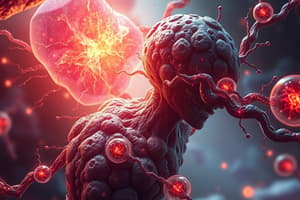Podcast
Questions and Answers
What was Charles Darwin's area of interest?
What was Charles Darwin's area of interest?
- Biomechanics
- Biogeography (correct)
- Biochemistry
- Biophysics
What is the definition of gene pool?
What is the definition of gene pool?
- A group of individuals of the same species living in the same area and interbreeding to produce fertile offspring.
- A chance event that causes a change in allele frequency from one generation to the next.
- The transfer of alleles into or out of a population due to fertile individuals or gametes.
- A population's genetic makeup consisting of all copies of every type of allele (correct)
Define population and gene pool.
Define population and gene pool.
Population refers to a group of individuals of the same species living in the same area and interbreeding to produce fertile offspring. Gene pool refers to a population's genetic makeup consisting of all copies of every type of allele.
What was Darwin's hypothesis about the origin of species on the Galapagos Islands?
What was Darwin's hypothesis about the origin of species on the Galapagos Islands?
What was Darwin's hypothesis about the Galapagos Islands?
What was Darwin's hypothesis about the Galapagos Islands?
What are mutations and what effects can they have?
What are mutations and what effects can they have?
What are mutations?
What are mutations?
What does natural selection act upon?
What does natural selection act upon?
What is the main factor that natural selection acts upon?
What is the main factor that natural selection acts upon?
What is genetic drift?
What is genetic drift?
What is genetic drift and how can it impact a population?
What is genetic drift and how can it impact a population?
Explain gene flow and how it can affect a population.
Explain gene flow and how it can affect a population.
What is gene flow?
What is gene flow?
What is the intention of natural selection?
What is the intention of natural selection?
Does natural selection have intentions?
Does natural selection have intentions?
What is natural selection and what are the three modes of natural selection?
What is natural selection and what are the three modes of natural selection?
Can organisms intentionally adapt to their surroundings through natural selection?
Can organisms intentionally adapt to their surroundings through natural selection?
Can organisms try to adapt to their surroundings through natural selection?
Can organisms try to adapt to their surroundings through natural selection?
What is natural selection?
What is natural selection?
What is sexual selection and how does it explain unique or showy traits in some species?
What is sexual selection and how does it explain unique or showy traits in some species?
What does "survival of the fittest" refer to?
What does "survival of the fittest" refer to?
What does "survival of the fittest" refer to?
What does "survival of the fittest" refer to?
What is sexual selection?
What is sexual selection?
What is evolution?
What is evolution?
What is evolution?
What is evolution?
What is the Hardy Weinberg principle?
What is the Hardy Weinberg principle?
What is the Hardy Weinberg principle and what are the five conditions that must be met for a population to be in Hardy Weinberg equilibrium?
What is the Hardy Weinberg principle and what are the five conditions that must be met for a population to be in Hardy Weinberg equilibrium?
What are the two formulas used to calculate the frequency of alleles and genotypes in a population?
What are the two formulas used to calculate the frequency of alleles and genotypes in a population?
What is natural selection?
What is natural selection?
What is natural selection?
What is natural selection?
What are the conditions that must be met to be in Hardy Weinberg equilibrium?
What are the conditions that must be met to be in Hardy Weinberg equilibrium?
What is the importance of genetic diversity in a population?
What is the importance of genetic diversity in a population?
Why is genetic diversity important for a population?
Why is genetic diversity important for a population?
Do individuals or populations evolve?
Do individuals or populations evolve?
What did Darwin study at the Galapagos Islands?
What did Darwin study at the Galapagos Islands?
What risks do species with low genetic diversity face?
What risks do species with low genetic diversity face?
What is biogeography?
What is biogeography?
What is the difference between genotype frequencies and allele frequencies?
What is the difference between genotype frequencies and allele frequencies?
What does natural selection act upon that leads to survival and reproduction?
What does natural selection act upon that leads to survival and reproduction?
Flashcards are hidden until you start studying
Study Notes
- Charles Darwin was an English naturalist who conducted research at the Galapagos Islands.
- Darwin was interested in biogeography, the geographic distribution of species.
- Darwin's hypothesis was that organisms left South America and colonized the Galapagos Islands where they diversified and gave rise to new species.
- Natural selection acts on genetic variations that lead to survival and reproduction, not what organisms "need."
- Natural selection has no intentions and only acts on traits that lead to survival and reproduction.
- Organisms cannot try to adapt to their surroundings through natural selection.
- "Survival of the fittest" refers to the organism that can survive and reproduce, not necessarily the strongest or healthiest.
- Evolution is the change in the genetic makeup of a population over time.
- Natural selection is a process in which individuals with certain traits tend to survive and reproduce at higher rates.
- Populations evolve, not individuals.
Studying That Suits You
Use AI to generate personalized quizzes and flashcards to suit your learning preferences.




